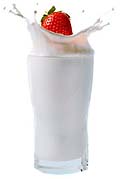Healthy Eating for the Later Years:
Dairy Is Extremely Important

Foods in the dairy group supply approximately 75 percent of the calcium we consume. In addition, dairy provides protein, phosphorus, potassium, and vitamins A, D, B12, and riboflavin.
Calcium, the most abundant mineral in the human body, has several important functions. More than 99% of total body calcium is stored in the bones and teeth where it functions to support their structure. The remaining 1% is found throughout the body in blood, muscle, and the fluid between cells.
Calcium is needed for muscle contraction, blood vessel contraction and expansion, the secretion of hormones and enzymes, and sending messages through the nervous system. A constant level of calcium is maintained in body fluid and tissues so that these vital body processes function efficiently.
According to new research, women who get the most calcium daily (from food sources such as low-fat dairy) slashed their odds of developing stomach, oesophageal, and colon cancers by about 23 percent. "Calcium tends to build up bile and fat in the digestive tract," says study author Yikyung Park. "That may prevent them from damaging the protective lining, which can up the risk for cancer."
Choose lower fat dairy products as these will be better tolerated, i.e. low fat milk, skim milk or skim milk powder. Yogurt is great with breakfast or as a snack with fruit.
If you do not eat dairy, it will be important for you to take a supplement that contains calcium.
|